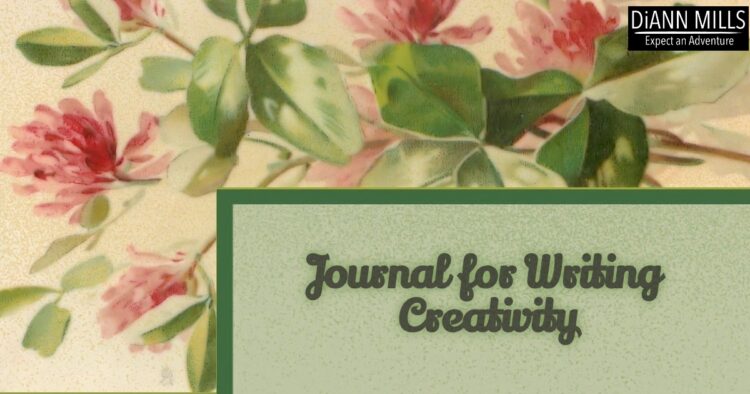By DiAnn Mills @DiAnnMills
Some people have journaled since they received their first notebook or diary. They entered information daily, weekly, or whenever the whim urged them to complete an empty page. Some of them used a lock to prevent others from reading their inner thoughts, while others hid their recollections where no one could find them. Many people today have continued to keep an accounting of day-to-day happenings. They reserve time to record events, prayers, challenges, victories, thoughts, emotions, and even art. The practice allows them to process what they’ve experienced and learn to cherish blessings and endure harsh blows.
Journaling is education for the soul. The person can envision how life could have been or can be better by using logic paired with emotions to work through weaknesses and capitalize on strengths. How grand to recall what we’ve forgotten. The process encourages mental and spiritual growth.
Writers have countless reasons to record their ups and downs. Journaling develops creativity with the understanding nothing is wasted in the writer’s life. Vulnerability is a powerful tool in the writer’s arsenal.
I value journaling as an assistant in creating characters, plots, settings, emotions, dialogue, and symbols. Below I’ll share how recording situations and circumstances has the potential to benefit writing and enlighten understanding of a story, including those that are not our own.
Brainstorming
Writers who exchange ideas or solve problems by sharing what they’ve learned from walking life’s roads add a level of expertise to their own stories and/or assisting other writers. Deepening character motivation and planning unpredictable plots make for a masterful book.
Characters learn from what the writer didn’t see or accept in their own life.
Learning early on to recognize errors in decisions makes us wiser and enables helping others. Truth and honesty deliver a powerful punch to a story. This technique of applying journaling to a story increases awareness of life-changing events.
Characters, unlike the writer, who refuse to process life’s twists and turns.
This concept works for protagonists and antagonists. Through a series of what-ifs and worst-possible-scenarios, writers look back at their own lives and envision the outcome of wearing blinders and choosing a stubborn attitude. The result is a lack of growth and failure to move ahead.
Developing a story from a heartache can be healing.
Most stories involve a character struggling through the anguish of lies, betrayal, deceit, manipulation, and/or tragedies. Writers who have walked a sorrowful road not only share believable emotions in their stories but also finds a source of healing in the transparency. Don’t be afraid to rip off the Band-Aid on your heart and share what disturbed or devastated you.
Story ideas emerge from circumstances that may or may not be the same as the writer.
Different perspectives often show a slice of life not encountered previously. People evaluate life according to their personalities. Introverts often quietly endure life’s disappointments and are private in their triumphs. Extroverts reach out to their lifeline of friends in victories and defeats. Both processes demonstrate varying viewpoints according to their personality. Neither is right or wrong. A writer who crafts a panorama of characters enriches the reader’s experience.
Journaling enhances our stories because we often forget the fresh emotions of a life happening. Be bold, fresh, raw, honest, and straightforward. If your interpretation is later proven wrong, record that too with new emotions. Try different methods of journaling to develop what works best for you.
How are you journaling to enhance your writing creativity?



Comments 14
DiAnn, I had a diary when I was ten years old & for awhile I wrote in it faithfully. Later I would journal off & on never fully grasping how cathartic it could be. When I moved from California to Indiana all my journals were “lost” by the moving company who laughed at us when several boxes were not delivered (we found out the hard way that they were not a reputable company. So, recently I’ve decided to write a memoir about the extraordinary things that have happened in my life. I am 71 years young & value what journaling can do so hopefully by writing “The Extraordinary Life of an Ordinary Woman”, I will be able to ‘replace’ some of the information I had journaled showing how God has worked in my life.
Cindy, I’m so sorry you lost those early treasures. I really like and encourage you to complete “The Extraordinary Life of an Ordinary Woman.” What a beautiful memory for your loved ones.
Journaling is a great way to tap into my inner most thoughts and feelings. It draws me closer to God and helps me evaluate my many blessings. I am blessed beyond measure.
Jackie, thank you for your insight. I also find that journaling helps me process whatever I’m going through.
Journaling involves looking back, stepping stones, guide posts, navigation, and learning along the walk of life with God.
Dawn, what a beautiful way to describe how journaling helps us journey through life with God. Thank you!
Journaling is a way to heal emotionally and a way to record our prayers. When we go back and read something written previously we can praise God for the answers He has provided and be reminded of His goodness.
Barbara, you are so right. A journal is like a blessing jar. We open it and see how God has provided for us in the past. Thanks you!
Oh, I love that.
I’ve been journalling since I was in my teens (eons ago) I like non-fiction writing, and usually choose posts which can encourage. In both books I am seeking to publish, I use a lot of truths and
lessons which I seek to apply to my life.
Disappointments including dreams I had to bury; provide down to earth tidbits,help to rebuild faith and courage.
I’ve been journalling since I was in my teens. (eons ago) I prefer non-fiction writing, so I often use
entrances from post to encourage friends. In both books I am seeking to publish, I use a lot of
truths and lessons I have learned, and sought to apply to my life.
Painful lessons, and disappointments including dreams I had to bury; provide down to earth tidbits
to which many can relate, or stories which help to rebuild courage, and faith.
Frances, your insight and empathy into Truth and living God’s way is a true gift. I’m glad you have chosen to journal the things in your life and others that have impacted you for the glory of God. Thank you, my friend.
This is a great encouragement, DiAnn! I struggle with consistency, but journaling helps unlock my pent up emotions from childhood abuse conditioning. I had a counselor tell me once decades ago that I’m “emotionally constipated.”
Do you journal at a set time during your day?
Karen, journaling is certainly a relief to being “emotionally constipated.” Love that analogy. I find writing down my innermost thoughts is healing, prayerful. I journal in the mornings before I start my day.